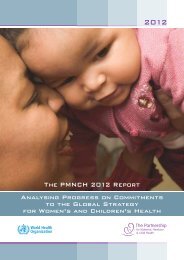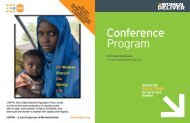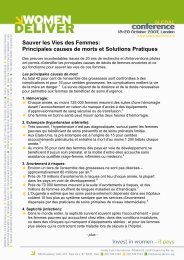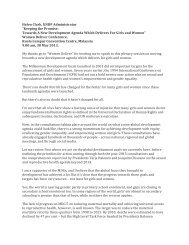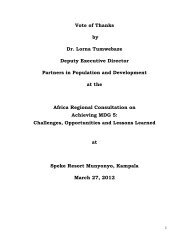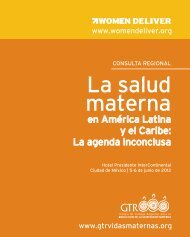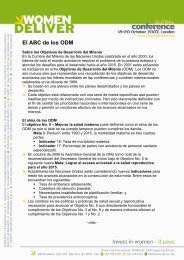State of World Population 2012 - UNFPA Haiti
State of World Population 2012 - UNFPA Haiti
State of World Population 2012 - UNFPA Haiti
Create successful ePaper yourself
Turn your PDF publications into a flip-book with our unique Google optimized e-Paper software.
CHAPTERSIXMaking the right t<strong>of</strong>amily planning universalAlmost 20 years have passed since the 179 governments represented at theInternational Conference on <strong>Population</strong> and Development, ICPD, transformedthe way the world approaches sexual and reproductive health, including familyplanning. While some progress has been made, there is still much work to bedone to realize the rights-oriented vision <strong>of</strong> the ICPD.tA couple with theirbaby in Brazil.©Panos/Adam HintonThe ICPD Programme <strong>of</strong> Action defined sexualand reproductive health and located family planningamong a broader interrelated set <strong>of</strong> rights.It pointed beyond programmes to the social andeconomic circumstances that shape people’s decisionsabout their sexual and reproductive lives anddetermine their ability to act on those decisions. Ithighlighted the roles and needs <strong>of</strong> adolescents, menand other groups not previously addressed. And itemphasized the need for services to respect individualrights and respond to individual preferencesin <strong>of</strong>fering family planning.For policymakers, international organizations,governments and civil society, this new rightsbasedapproach was seen as revolutionary, partlybecause it created obligations for governments tomake reproductive health services and suppliesavailable to all. But was the shift experienced asrevolutionary by ordinary people, the individualwomen, men, girls and boys the ICPD wasintended to help?Where the right to family planning has beenupheld and access to it increased, people havebenefited—through better health, higher incomes,reductions in poverty and greater gender equality.But the ICPD has not yet changed daily realitiesfor the hundreds <strong>of</strong> millions <strong>of</strong> people who want toavoid or delay pregnancy but are unable to eitherbecause they still have no reliable access to qualitycontraception, information and services or becausethey face insurmountable social, economic andlogistical obstacles.These individuals have missed out on theimprovements in health, empowerment andenjoyment <strong>of</strong> a range <strong>of</strong> other rights that familyplanning can facilitate or catalyse. The challengesare most acute in developing countries but existalso in developed countries, where many womenand men are unable to access family planning, arepoorly served or are dissatisfied with the methodsthey use.The vision <strong>of</strong> the ICPD has yet to be translatedfully into a rights-based approach to sexual andreproductive health policies and programmes,with quality and access for all.As a consequence, too many individuals still lackthe power to make decisions about family size andthe timing <strong>of</strong> their pregnancies.THE STATE OF WORLD POPULATION <strong>2012</strong>97




